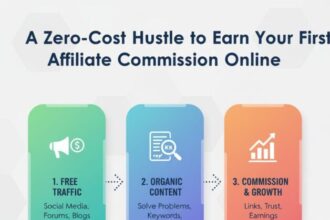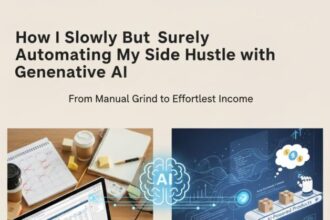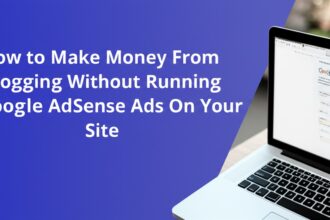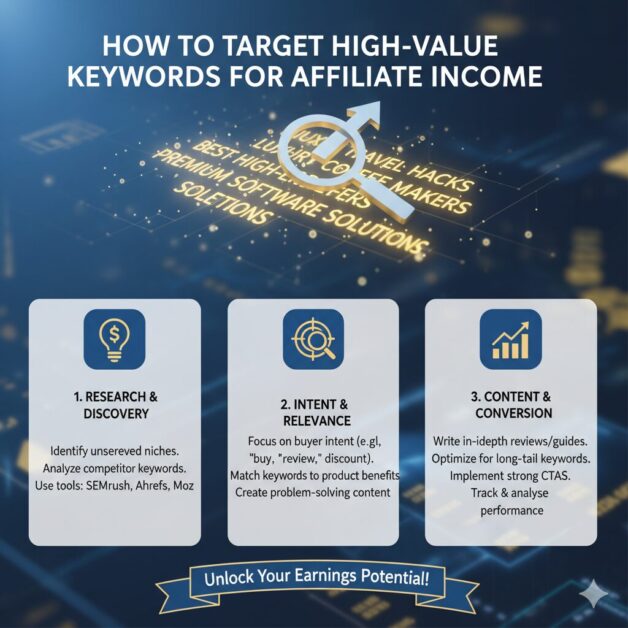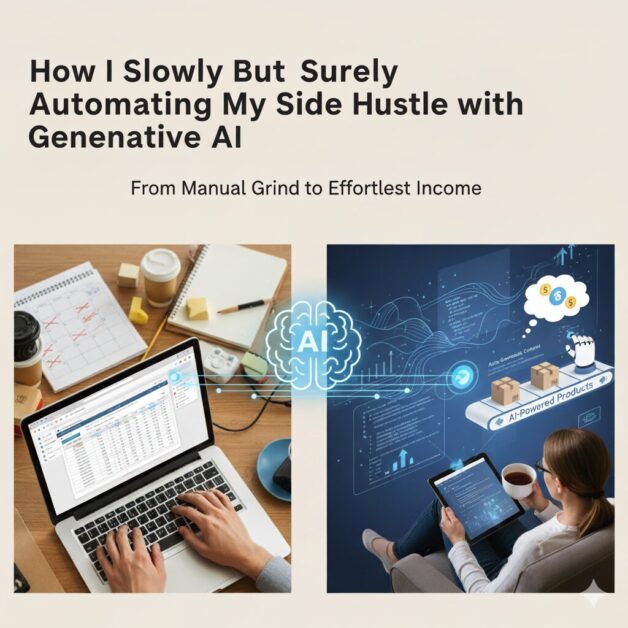How to Target High Valued Keywords for Affiliate Income
So, lemme set the scene for you. It’s late. Again. My cat, Mittens, is asleep on my keyboard, which is honestly typical. I’m slumped in my chair, nursing what was once a hot cup of tea, now decidedly cold. And I’m just staring. Like, really staring. You know that blank, slightly terrified look? That was me. My website, this little passion project I’d poured countless hours into, was getting some clicks, bless its heart. But the money? The actual, honest-to-goodness affiliate income? It was, well, it was basically zero. Zip. Nada. And here I was, just trying to figure out how to target high-value keywords for affiliate income. It felt like trying to find a needle in a haystack, blindfolded, in a hurricane. It really did.
I remember thinking, “Is this even worth it?” That question, right? It hits different when you’re exhausted and the numbers just aren’t adding up. I’d started this whole thing with such high hopes, you know? Like, “Oh, I’ll just write about stuff I love, pop some links in, and boom! Passive income!” Ha. Hilarious. The reality was a lot more “boom! Zero income!” So much for my brilliant business plan. My dream of making enough extra cash to maybe, just maybe, treat myself to something other than generic store-brand coffee felt… pretty stupid, to be honest.
I was getting traffic, sure. People were visiting. But they weren’t buying. It was like I was inviting a bunch of people to a party, and they’d all just stand around, politely nodding, then leave without touching the snacks. Seriously frustrating. I’d try to promote something, anything really, thinking, “This is it! This product is amazing!” And then… crickets. Always crickets. It was a vicious cycle of effort and utter disappointment. My early affiliate marketing strategies were, if I’m being brutally honest, basically non-existent. More like hopeful wishes whispered into the void.
So, yeah, I was at a low point. Really low. I could’ve just thrown in the towel. Said, “Screw it, this affiliate thing isn’t for me.” And believe me, that thought crossed my mind more times than I care to admit. But there’s this stubborn little voice in my head, always has been, that just won’t let me quit. It kept nagging, “There has to be a way. You’re just missing something.” And that something, I slowly began to realize, was probably all about these “keywords.” But not just any keywords, oh no. The good ones. The money-making ones. The “high-value” ones.
That’s how this whole messy, confusing, and sometimes ridiculously frustrating adventure began. My deep dive into the rabbit hole of keyword research. There were so many dead ends, so many moments where I genuinely felt like my brain was going to melt. More than a few times, I just wanted to bang my head against the wall. But little by little, like chipping away at a giant block of ice, I started to see patterns. I started to understand. And if I can, well, I’m pretty darn sure you can too. Because if my brain, which often struggles to remember where I put my keys, can grasp this, then yours definitely can.
Oops, My Bad: When “Lots of Clicks” Meant “No Money”
So, here’s a super embarrassing confession. When I first started my blog, my whole “keyword strategy” was hilariously basic. I mean, truly. I’d just fire up one of those free keyword tools online – you know, the ones everyone talks about? – and type in a super broad term for my niche. Let’s say, oh, “best dog toys.” Then, I’d just look at the column that showed “search volume.” “Wow!” I’d think to myself, probably a little too loudly. “This one gets, like, 50,000 searches a month! I’ll write about that!”
And that was it. My entire brilliant plan. I’d write a whole article trying to rank for that super general, super competitive phrase. And then I’d wonder why I was on page seven of Google, if I even made it that far. And spoiler alert: nobody, and I mean nobody, ever goes to page seven of Google. Ever. My poor little articles were just sitting there, gathering digital dust.
What I didn’t grasp back then, not for a long, long time, was that high search volume by itself is pretty much meaningless if you’re actually trying to earn some cash. It’s like shouting into a massive concert hall. Lots of people hear a noise, right? But are they actually listening to you? Are they looking for what you’re selling? Nope. Probably not. I was getting this generic, almost useless traffic. People just casually browsing, not people who had their wallet halfway out, ready to buy. All that effort, all that writing, for basically nothing. It was beyond disheartening.
My earliest attempts at affiliate keyword research tactics were, if I’m being honest, just a shot in the dark. More like throwing spaghetti at the wall and hoping something, anything, would stick. And it just wasn’t. Because I wasn’t thinking about why someone was searching. Just how many people were searching. Huge, huge difference, as I eventually learned. Took me a while, though.
The Lightbulb Moment: Discovering “Long-Tail” (It’s Not a Dragon!)
So, I was in this affiliate marketing forum, just scrolling, feeling pretty defeated. And then I saw someone mention “long-tail keywords.” I remember thinking, “Long tail? Like a dragon?” My mind went to some pretty weird places back then. But I kept reading, and suddenly, something clicked. Like, a real, honest-to-goodness “aha!” moment.
Instead of chasing those super broad, one- or two-word terms like “dog toys,” people were talking about phrases like “most durable squeaky dog toys for aggressive chewers.” See how much more specific that is? It’s like, five or six words long. That’s the “long tail.” And the more I thought about it, the more it made sense. Someone searching for that exact phrase probably knows what they want, right? They’ve probably had a few chewed-up toys already. They’re looking for a very specific solution.
My brain actually started buzzing a little. Instead of trying to cast a giant, mile-wide net in the ocean and catching a million tiny, uninterested fish, I could cast a super precise, small net in a very specific spot and catch a few really big, really interested fish. People who knew exactly what they were looking for. People who were way closer to actually buying something. This felt like actual detective work, like I was finally getting somewhere. It wasn’t just guesswork anymore.
This, I realized, was my very first real step toward understanding long-tail keywords for affiliates. It felt like I’d finally found a tiny, almost hidden, key to unlock a door I didn’t even know was there. The search volume for these super specific phrases might be smaller, yeah. But the quality of the traffic? Oh man, that’s where the magic happens. And that, I figured, was worth chasing. Way more worth chasing.
The “Why”: What Do People Really Want When They Search?
Okay, so the “long tail” thing was a big breakthrough. But then I hit another wall. Because even with long-tail keywords, I still wasn’t quite hitting the mark sometimes. That’s when I had to go even deeper. I had to start thinking about the “why.” Why is someone typing that specific phrase into Google? What problem are they trying to solve? What are they hoping to do with the information they find? This, I learned, is all about understanding “buyer intent.” It’s huge, absolutely huge.
I started looking for these little linguistic breadcrumbs. You know, words like “best,” “review,” “vs.” (as in, product A versus product B), “discount,” “coupon,” “cheap,” or even phrases like “where to buy.” These aren’t just random words; they’re like big, flashing neon signs that tell you someone is beyond the casual browsing stage. They’re past the “just curious” phase. They’re serious. They’re comparing options. They’re looking for a deal. And, most importantly, they’re likely looking to buy something. These are what I eventually started calling high-converting keywords. And they were pure gold.
Think about it this way: Someone searching “how to plant roses” is probably just looking for general gardening tips. They’re in the learning phase. But someone searching “review of David Austin roses for zone 7b” is probably ready to buy some roses, right? They’ve already done their basic research. They know what kind they want. They just need a final push or a confirmation that they’re making a good choice. I definitely wanted to be in front of those people. They were my ideal audience.
It wasn’t just about the specific words, though. It was about the whole query. The complete thought. What’s the user’s journey? Where are they on that path? Really, genuinely putting myself in the searcher’s shoes – that’s what finally made the difference. It sounds almost ridiculously simple, but it’s a massive shift in perspective from just blindly chasing big numbers. A really profound shift, actually.
Finding My Tiny Corner: How I Chose My Affiliate Niche
After I started getting a handle on long-tail and buyer intent keywords, my next big puzzle was figuring out where to even apply all this newfound knowledge. My overall niche, you know, “sustainable living,” felt… gigantic. Like, impossibly huge. Trying to be an authority on all of that? Forget about it. I needed to shrink it down. Way down. I needed to find my little sweet spot where there wasn’t a ton of competition, but there were plenty of people actively looking to buy something. This is where really focused affiliate niche selection became absolutely crucial for me.
I started thinking about micro-niches. Instead of just “eco-friendly cleaning products,” what about “zero-waste dish brushes for sensitive hands”? Or, instead of “sustainable fashion,” maybe “ethical activewear for plus-size women.” These are so much more precise, aren’t they? And the fantastic thing about it is, while fewer people might search for those exact, super-specific terms, the ones who do are incredibly, powerfully targeted. They know exactly what they want. They’re not just browsing.
I actually spent a lot of time lurking on forums, checking out Reddit communities, even reading through the comments and reviews on Amazon. I was basically a digital detective, sniffing out those very specific problems people were complaining about. What unique needs weren’t being adequately met by the more mainstream products? Those little pain points, those unmet desires, often led me straight to amazing, previously untapped keyword opportunities. It genuinely felt a bit like being a treasure hunter, digging for hidden gems right there in plain sight. And when you actually find one of those gems? Man, that’s such a good feeling. It really is.
This whole approach meant I wasn’t constantly trying to compete head-to-head with those massive, established sites that have been around forever. Instead, I was carving out my own little corner. My own little territory. And in that specific corner, I could actually, genuinely win. I could become the go-to resource, the trusted voice, for that exact, super-specific thing. And that, I slowly but surely realized, was the clearer path to actual, tangible affiliate success. Because, let’s be honest, being a small fish in a tiny, focused pond is infinitely better than being a microscopic plankton in a vast, overwhelming, and uncaring ocean. Right?
My Secret Spy Tactics: Peeking at What the Pros Were Doing
Okay, so this part felt a little bit like I was doing something I shouldn’t be, almost like I was being sneaky. But it’s completely legitimate, I promise you! Once I had a much better grip on long-tail keywords and understanding buyer intent, I started wondering, “What are the really successful affiliate sites in my niche actually doing? How are they getting all those sales?” I mean, they were clearly making money, so they had to be doing something right, didn’t they? That’s where competitive keyword analysis tools became incredibly useful for me.
Now, I’m not talking about outright copying, just to be super clear. Never copy. That’s just bad karma and bad business. Instead, it was more about getting inspiration and trying to understand what strategies were already proving effective. I’d use various tools (some free ones to start, then I gradually invested in a couple of paid ones) to see what keywords my competitors were actually ranking for. Which specific pages on their websites seemed to be pulling in the most traffic? What particular products were they reviewing that seemed to be generating a lot of buzz and sales? It honestly felt like I was getting a little peek behind the curtain, like I’d found a secret backdoor.
Sometimes, I’d stumble upon keywords they were ranking for that I hadn’t even considered. “Oh, wow, that’s a good one!” I’d think. Other times, I’d notice a keyword they were attempting to rank for, but their existing content wasn’t quite hitting the mark or felt a bit thin. And that, my friends, was my golden opportunity! I could then make a conscious effort to create something even better, something more in-depth, more genuinely helpful, and then try my best to snag that traffic for myself. It’s a bit like a friendly rivalry, I suppose. You learn from the best, you try to understand their moves, and then you work your tail off to try and be even better.
This step was absolutely crucial because it helped validate my own keyword choices. If a competitor was successfully ranking for a similar long-tail, buyer-intent keyword, it gave me a huge boost of confidence that I was genuinely on the right track. And it often sparked brand new ideas, too. It’s like having a benchmark, a really clear way to measure your own efforts against those who are already experiencing success. Which, let’s face it, is incredibly, massively helpful when you’re just trying to figure things out and constantly questioning yourself. It gives you a roadmap, or at least a compass.
The Craft of Writing: Not Just Keywords, But Real Human Help
So, I had my keywords, right? I understood buyer intent. I’d even managed to peek at what my competitors were up to. Now came the arguably hardest part: actually sitting down and writing the content. This wasn’t just about trying to cram as many keywords as possible into an article, by the way. Oh no. That’s a surefire way to get penalized by Google, and probably annoy your readers so much they’ll never come back. It was about creating genuinely helpful, truly valuable content that naturally incorporated those high-value keywords. Content that would actually help me with monetizing content strategies.
My entire approach to writing changed pretty dramatically. Instead of just writing about a vague, general topic, I started asking myself, “What very specific problem does this particular keyword actually solve? What exact question is the searcher trying to get answered?” Then, and only then, would I write an article that aimed to answer that question as thoroughly, as clearly, and as engagingly as humanly possible. My goal was to become the most helpful resource out there for that specific query. For instance, if someone was searching for “best lightweight backpacking tent for solo female travelers,” I wanted my review to be the ultimate, most comprehensive guide they could possibly find.
I also really, really focused on the importance of structure. Subheadings became my best friends. Bullet points, definitely. And those super short paragraphs? Absolutely vital. All these things make an article incredibly easy to skim and read, especially on a phone. Because let’s be real, most people are consuming content on their mobile devices these days, aren’t they? And if your content looks like a giant, overwhelming wall of text, they’re just gone. Swiped away. Instantly. Google actually rewards content that is easy and enjoyable for users to consume. So, it’s a huge win-win situation.
This whole process meant a lot of editing. A serious amount. A lot of making sure my language felt natural, conversational, and just flowed really well, even with those precious keywords carefully sprinkled in. It’s a truly delicate balance, this art of writing for both the mysterious search engine algorithms and for actual, living, breathing people. But when you finally manage to get it right? Oh, man, that feeling is genuinely good. It feels like you’re truly helping someone out, solving their problem, and that, for me, is a fantastic feeling. It makes all the hard work worth it.
Product Deep Dives: The Power of Specific Review Keywords
Okay, let’s get into the nitty-gritty of products, because that’s where the money actually happens, right? I quickly learned that just promoting any product wasn’t cutting it. I had to be strategic. And that meant using what I started calling product review keywords. These are the phrases people type in when they’re really close to buying something. They’re past the general research phase; they’re looking for that final push.
Think about it: someone searching for “best coffee maker” is still pretty broad, right? But someone typing “Keurig K-Elite review” or “Nespresso Vertuo Next problems” is definitely in decision-making mode. They’ve probably narrowed down their options. They just need confirmation, a side-by-side comparison, or an answer to a specific concern. That’s where I wanted my content to be. Right in front of those people.
My strategy evolved to focus heavily on detailed, honest product reviews. I’d pick a specific product I either owned, had used, or had thoroughly researched, and then I’d write an article specifically around “[Product Name] review” or “[Product Name] vs. [Another Product Name].” I’d dig into the pros, the cons, who it’s best for, who it’s not for. I’d try to anticipate every question someone might have before pulling out their wallet.
This approach means you’re not just throwing product links at people. You’re becoming a trusted resource, a helpful guide. You’re building credibility. And when people trust you, they’re much more likely to click your affiliate links. It’s a fundamental shift, really. From just linking, to genuinely helping people make informed purchasing decisions. And that, I’ve found, is incredibly effective for converting those clicks into actual commissions.
The Money Math: Why Affiliate Commission Rates Are So Important
Alright, let’s talk turkey. Because all this amazing keyword research, all this incredible content writing? None of it means much if you’re promoting products with terrible affiliate commission rates. I learned this lesson the really hard way, believe me. I spent ages, absolute ages, writing glowing reviews for a product that had, like, a measly 2% commission. And the product itself was only, maybe, twenty bucks. You do the math there. That’s a grand total of forty cents per sale! I would have needed to sell an astronomical amount of those things to make any kind of meaningful money. It was just… unsustainable.
So, I had to get smart. I started actively seeking out products with significantly better commission structures. Sometimes, that meant looking for higher-priced products (because even a small percentage of a large number is still a decent payout). Other times, it meant specifically finding products, especially digital ones like courses or software, that offered genuinely generous commission percentages – think 10%, 20%, or even a fantastic 50%. The difference in my earnings was, quite frankly, jaw-dropping. It’s a huge, huge factor.
It’s also, and this is super important, about truly believing in the product itself. Is it something people genuinely need and want? Is it of high quality? Would I actually buy and use it myself? Because if you’re just blindly promoting junk, or something that doesn’t honestly align with your own values, it’s going to feel wrong. And your audience, trust me on this, they’ll eventually see right through it. Authenticity is still, always, absolutely key, even when you’re thinking about your bottom line. A study from the Interactive Advertising Bureau (IAB) really highlights how important trust and transparency are in affiliate relationships. You can find more on that here: https://www.iab.com/news/affiliate-marketing-landscape-and-best-practices/
This part of the process definitely required a bit more financial thinking than I was naturally comfortable with. But I forced myself to do the calculations. To critically evaluate whether a particular product was truly worth my precious time and effort to promote. Because at the end of the day, this is a side hustle. It’s supposed to bring in some extra cash. And understanding those commission rates, and optimizing for them, is absolutely fundamental to making that happen. Don’t, whatever you do, ever skip this step. It’s too important.
The Big Picture: Understanding Affiliate Income Potential
Okay, so putting all these pieces together – the long-tail keywords, the buyer intent, the competitive analysis, the smart product choices – it all leads to the overarching concept of affiliate income potential. It’s not just about one keyword or one product; it’s about the whole ecosystem you’re building. And it’s about understanding that some niches, some products, and some keyword strategies just have a naturally higher ceiling for earnings.
I learned that some niches, like finance or health, often have higher-paying products or services you can promote. Their commissions might be lower percentages, but the price points are much higher, leading to bigger payouts. Other niches, perhaps more passion-driven ones like crafts or gardening, might have lower-priced products but make up for it in sheer volume or a more passionate, engaged audience. It’s about finding that balance that works for your specific side hustle.
This means you can’t just pick any keyword or any product willy-nilly. You have to be thoughtful. You have to consider the bigger picture. What’s the average order value? How often do people buy this type of product? Is it a one-off purchase, or something with recurring revenue (like a subscription service, which is fantastic for affiliates)? These are all super important questions to ask.
It’s not just about getting a click; it’s about getting a valuable click that actually leads to a sale and a decent commission. It’s about maximizing every piece of content you create. And honestly, it’s about getting smarter with your time and effort. Because time, especially when you’re juggling a side hustle with everything else, is your most precious resource. That’s why understanding the true income potential of your chosen path is so critical.
Beyond Google: My Keywords Informed Everything Else
Okay, so obviously, we’ve spent a ton of time talking about Google and search engines. And that’s totally justified, because they’re a massive source of traffic, right? But here’s something else I quickly cottoned onto: those amazing high-value keywords, especially the super-specific long-tail ones, they aren’t just good for getting found on Google. Oh no. They’re actually incredibly, powerfully helpful for all my monetizing content strategies. They help me understand my audience on a much deeper level, even when they’re not actively searching.
When I successfully identified a really great, buyer-intent keyword, it didn’t just become the main topic of one particular blog post. Instead, it transformed into a kind of guiding light, a strategic beacon, for basically every other area of my side hustle. For instance, if I discovered that “best ergonomic mouse for small hands for graphic designers” was a highly searched and high-value term, it wasn’t just for an article. It actually inspired a whole bunch of my social media posts. It gave me fantastic ideas for topics to cover in my email newsletters. It even directly influenced what kinds of images I was creating to accompany my content.
It’s truly all about digging deep and understanding the incredibly specific needs and desires of your target audience in such granular detail. Because once you genuinely know exactly what they’re looking for, what problems they’re trying to solve, and what solutions they’re hoping to find, you can then create content that authentically resonates with them, no matter where they actually encounter it. Maybe it’s a quick, helpful video review on Instagram. Or a pithy, actionable tip embedded in an email. The keyword research, especially the high-value kind, literally informs all of it. It’s definitely not just for SEO; it’s for truly, deeply connecting with your ideal customer in a way that feels natural and helpful.
This actually felt like another one of those massive “aha!” moments for me. The keyword research wasn’t a one-and-done task that you tick off your list. It became an ongoing, foundational strategy that influenced literally everything I did. It helped me create a much more cohesive, incredibly targeted, and ultimately much more effective approach to my entire online presence. And that, I’ve absolutely found, is unbelievably powerful for actually making consistent, tangible affiliate sales. It ties everything together.
The Toughest Lesson: Patience, Patience, Patience (Ugh!)
Okay, so I’m going to be completely, brutally honest here: affiliate marketing, especially when you’re just starting out, demands an almost superhuman amount of patience. Like, a ridiculous, infuriating amount, actually. You don’t just publish one amazing article with a perfectly targeted high-value keyword and then instantly watch the money start rolling in overnight. Oh, if only that were the case! If only it were that easy, I’d be sipping cocktails on a beach somewhere, trust me. It’s a long game. A very, very long game. And that, I have to admit, was an incredibly tough pill for me to swallow at first.
There were so many times, honestly, that I just felt like throwing in the towel. Weeks would crawl by, sometimes even entire months, with hardly any noticeable movement. My painstakingly crafted articles would inch, almost imperceptibly slowly, up the search rankings. Or, worse, sometimes they wouldn’t budge an inch at all. It was disheartening, to say the least. It’s really, really hard to stay motivated when you’re pouring in so much effort, so much heart, and seeing such painfully little immediate return on that investment. You start to doubt absolutely everything. “Am I doing this completely wrong? Is this whole thing even worth my time and energy?” These nagging thoughts would constantly, relentlessly run through my head.
But, somehow, I kept at it. I pushed through. I kept publishing new content. I kept refining my old articles. I kept doing my research, always learning. And then, slowly, almost imperceptibly at first, things actually started to shift. An article I’d painstakingly written months and months ago would suddenly, miraculously, jump to page one for a particular long-tail keyword. And then, the sales would start to trickle in. Not a flood, not a dramatic tidal wave, but a steady, consistent trickle. And that trickle? Well, it gradually started to grow. It gave me this massive, much-needed boost of confidence. It showed me, unmistakably, that the strategy worked, you just had to be incredibly, ridiculously, almost annoyingly patient.
This entire, winding journey has truly taught me a profound amount about persistence. You plant the seeds, you carefully water them, you wait. And eventually, if you’re doing things correctly and consistently, they absolutely start to grow. It’s genuinely like tending a garden, isn’t it? Some plants sprout super fast, while others take their sweet, sweet time. But they do sprout. You just can’t rush Mother Nature, and you most certainly cannot rush Google. I actually found an interesting piece on Search Engine Journal that emphasizes consistency as a core component of long-term SEO success. It really resonated with my experience: https://www.searchenginejournal.com/consistent-seo-results/474136/ It’s a full-on marathon, not a quick dash. And that, I’m constantly reminding myself, is a crucial mindset to cultivate.
My Brain’s Still Learning: Because This World Never Stops Changing
Even now, after all this trial and error, all these hard-won lessons, all these little victories, I definitely don’t kid myself into thinking I’m some kind of expert. Absolutely not! The whole world of SEO and affiliate marketing is just constantly, relentlessly changing. Google is always updating its mysterious algorithms. New, fancy tools seem to pop up literally every other day. What worked brilliantly yesterday might not work quite as well, or even at all, tomorrow. So, yeah, the learning curve is truly, genuinely ongoing. It never, ever really ends.
I’m always reading. Always listening to podcasts about digital marketing. Always experimenting with new ideas and approaches. I try out new keyword tools, just to see what they offer. I test different content formats to see what resonates. I constantly, meticulously analyze my results. What’s actually working? What isn’t quite hitting the mark? What can I tweak, even just a little bit, to make it better? It’s a continuous, never-ending process of discovery, adjustment, and sometimes, total re-evaluation. And sometimes, yeah, I still have those exasperated “head-desking” moments. Like, just last week, I totally butchered a keyword integration in a new article and had to go back and painstakingly rewrite an entire section. Oops. My bad.
But you know what? That’s totally fine. That’s absolutely part of the journey, isn’t it? The real key, I honestly think, is to simply stay curious. To never, ever get complacent. To always be genuinely willing to learn new things and quickly adapt to new changes. Because the very moment you start to think you know it all, that’s probably the exact moment when things will inevitably shift right under your feet and catch you off guard. This isn’t a set-it-and-forget-it kind of endeavor. It’s dynamic. It’s alive. It’s constantly evolving.
My core focus, however, remains rock-solid: being genuinely, truly helpful to my audience. That, more than anything else, is my ultimate guiding principle. If I can provide real, tangible value, if I can thoroughly answer their burning questions, and if I can wholeheartedly recommend products that I honestly believe in, then those high-value keywords and, crucially, the affiliate income, will, I deeply believe, naturally follow. It’s fundamentally about building genuine trust. And that, my friends, is something no cold algorithm, no matter how clever, can ever, ever truly replace. That human connection, that authenticity, is your superpower.
So, All That Work? Totally Worth It, I Think
Looking back now, at all those frustratingly late nights, all those nagging moments of self-doubt, all those almost comically tiny commission checks… I can honestly, hand-on-heart, say it was worth every single bit of the struggle. Absolutely. Figuring out how to target high-value keywords for affiliate income hasn’t just given my little side hustle a much-needed, actually measurable, financial boost. It’s actually given me so much more than that. It’s given me a huge dose of confidence.
It showed me that I can, indeed, figure out incredibly complex things, even when they seem totally baffling at first. It reinforced that persistence, that sheer stubbornness, really does pay off in the long run. And it proved that, with a good bit of diligent research and a whole lot of strategic, thoughtful thinking, you genuinely can turn a passion project into something that actually, tangibly contributes to your life. Not just endlessly draining it of all your energy. It’s truly empowering, you know? It made my side hustle feel less like a hobby I was constantly apologizing for, and much more like a proper, viable, and frankly, pretty cool venture.
My website traffic? It’s steadily growing now. More importantly, my conversion rates, the actual sales, are looking a whole lot healthier than they used to. And yes, my monthly affiliate income is now well past the “fancy coffee” stage. Sometimes, if I’m lucky, it even covers a really nice dinner out. Or puts a very decent dent in those ever-present holiday gift budgets. And that, for a regular, everyday person like me, is a pretty incredible, truly satisfying feeling. It shows, unequivocally, that the long game, when played with a smart, consistent strategy, really does, truly, profoundly work.
So, if you’re currently where I was, feeling completely lost and overwhelmed in that vast, confusing keyword wilderness, please, please don’t give up hope. It’s undeniably a tough road, I won’t even try to argue that. But by really focusing intently on those high-value, buyer-intent, long-tail keywords, by genuinely understanding your specific niche, by wisely learning from what your competitors are doing, and by always, always prioritizing helpful, human-centric content, you absolutely can turn things around. You really, truly can. Trust me on this one. It’s a full-blown marathon, not a quick, desperate sprint. But that finish line? Oh, that finish line is completely, utterly worth running towards. So, go on, lace up those digital running shoes, take a deep breath, and let’s get started. You got this!
